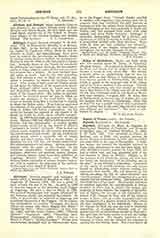

Aiguillon, DUCHESS OF, Marie de Vignerot de Pontcourlay, Marquise of Combalet and Duchesse d’Aiguillon, niece of Cardinal Richelieu, b. 1604; d. at Paris, 1675. First promised to Comte de Bethune, son of Sully, she married Antoine de Roure, Marquis of Combalet, in 1620, who was killed two years later at the siege of Montpellier. A childless widow, she entered the Carmelite convent in Paris, fully determined to end her days there; but after Richelieu became premier of Louis XIII she had to follow him, and was appointed lady of the bedchamber to Marie de Medicis. Obliged to do the honors of the Cardinal‘s palace, she took into her hands the distribution “of his liberality and of his alms”, to use Flechier’s expressions. Convinced of the vanity of worldly honors, she only busied herself in distributing riches without seeking any enjoyment from wealth. She well deserved, by her virtues and piety, the title of “great Christian” and “heroic woman”, which her panegyrists give to her. Charity was her dominant virtue. She had part in all the beneficence of her times. She founded, endowed, or enriched especially the establishments of foreign missions in Paris and in Rome; the church and seminary of Saint Sulpice; the hospitals of Marseilles and of Algiers; the convent of the Carmelites; the Sisters of St. Vincent de Paul, and all the religious houses of Paris. She gave fifty thousand francs for the foundation of a general hospital in Paris, which she first established at La Salpetriere. Patron of St. Vincent de Paul, she was the soul of charitable assemblies, of evangelical missions, and of the greater part of the institutions created by that saint. She gave him the funds needed to found the College des Bons-Enfants. Her charity extended to the missions of China and she defrayed the expenses of sending the first bishops there. But it was above all the colony of Canada which received a large share of her benefits. She especially recommended this work to her uncle, and Richelieu sent some Jesuits there. The Hotel-Dieu at Quebec was erected at her expense, and she put the Religieuses Hospitalieres of Dieppe in charge of it, after providing for it an annual income of three thousand francs. Masses are still said there daily for the intention of herself and of Richelieu, and an inscription composed by her is over the principal entrance. It was under her exalted patronage that the first Ursulines were sent there. With Olier, she conceived the plan of founding the Colony of Montreal and got the Pope to approve of the society which was formed for this purpose. Finally she had the creation of the bishopric of Quebec brought before the General Assembly of the French clergy, and obtained from Mazarin a pension of 1,200 crowns for its support.
This woman of great mind was sought in marriage by princes of the royal blood, but she preferred remaining a widow the better to pursue her good works. When she was created Duchesse d’Aiguillon she gave twenty-two thousand livres to found a mission for instructing the poor of the duchy. She was equally the enlightened patroness of the writers of her time. Voiture, Scudery, Moliere, Scarron, and Corneille were recipients of her favors. The last named dedicated to her “Le Cid”.
After the death of Richelieu, who made her his principal heir, she retired to the Petit-Luxembourg, published her uncle’s works and continued her generous benefactions to all kinds of charities. She carried out the Cardinal‘s last request by having the church and the college of the Sorbonne completed, as well as the Hotel Richelieu, which has since been converted into the Bibliotheque Nationale. The great Flechier was charged with pronouncing her funeral oration, which is regarded as one of the masterpieces of French Pulpit Oratory.
J. EDMOND ROY

